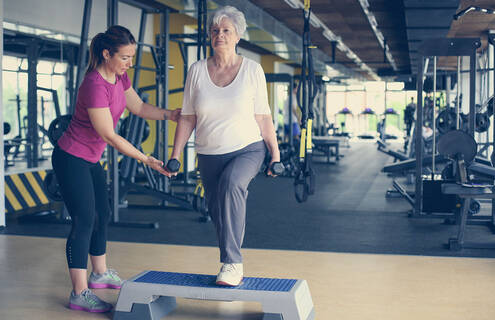
What is the truth about testosterone levels in men? Is there such a thing as male menopause? Should men be concerned about "hormone imbalances"?
There is no question that testosterone plays an important role in men, says Endocrinologist Ugis Gruntmanis, MD, who is also director of Bone Health and Osteoporosis at Dartmouth Health and professor of medicine at Geisel School of Medicine at Dartmouth.
Not only is the hormone vital to a man’s sexual development and health, but it can also help build muscle, bone health, and even red blood cell production, he says.
But does that mean men should actively work to boost their testosterone as they age?
The answer depends in part on how you go about it, says Gruntmanis.
Here, he provides answers to common questions from men about testosterone, its effects, and what to do if you are concerned that your testosterone levels are dropping.
What are the benefits of testosterone?
Testosterone is a key hormone. Its role in sexual development and sexual health in men includes supporting the development of the penis and testes at birth, the deepening of the voice, and the appearance of facial and pubic hair during male puberty. Testosterone is also important to a man’s libido, erectile function, and the process of sperm production in adults.
In addition to its roles in sexual and reproductive health—as well as in supporting muscle mass and bone strength—testosterone is reported to improve metabolism, energy, mental acuity, and mood, particularly in older men.
Do testosterone and other hormones function similarly in men and women?
Testosterone is not a “male” hormone. Women have the hormone too, just usually in lower amounts.
In both men and women, testosterone plays an important role in maintaining muscle mass and strength, bone health, libido, and other functions.
There are other similarities in how hormones function in men and women. For example, men have a testosterone cycle, just as women have a hormone cycle, though a man's testosterone cycle runs every 24 hours, with levels at their lowest at night before sleep and reaching their highest in the early morning.
And just like women, men also should not spend time or money on so-called hormone balancing, a popular TikTok trend for women. “There is no science behind that,” says Gruntmanis.
But when it comes to testosterone and other hormones, one big difference between men and women is that there is no male menopause.
“In women, hormone production falls over a fairly short amount of time as ovulation ends and menopause sets in. But for men, the production of testosterone drops slowly over many years, usually beginning with middle age, and is associated mainly with increasing weight and inactivity,” says Gruntmanis.
That means, unlike women who are usually well aware of how their bodies are changing, the change in hormone levels for men is not as marked.
What are normal levels of testosterone for men?
In general, adult males have testosterone levels that range from 300 to 1,000 nanograms per deciliter (ng/dL).
But men over the age of 45 usually have less testosterone than younger men. As a man ages, the difference between his morning and end-of-day levels also lessens, so older men tend to have steadier testosterone levels throughout the day.
Additionally, while baseline hormone levels vary among men, the only way to accurately determine whether your testosterone level is decreased is through a blood test. If your levels are low, it is critical to ask why.
What are the symptoms of low testosterone?
Some men, particularly older men, have low testosterone as their weight increases. In fact, testosterone deficiency affects approximately 7% of men in their 50s.
Gruntmanis says symptoms of low testosterone include:
- Lowered sexual desire
- Erectile dysfunction.
- Breast tenderness or swelling.
- Infertility.
- Low-trauma fractures or low bone mineral density.
- Hot flashes or sweats
Other possible symptoms of low testosterone include less energy, motivation, and confidence. Some men also feel depressed and have trouble focusing.
Low testosterone can also lead to a decrease in muscle mass.
Could you have low testosterone and not know it?
Low testosterone levels in older men often go unnoticed, says Gruntmains.
A Massachusetts Male aging study showed that only 30% of men have symptoms, and 70% are entirely asymptomatic when testosterone is low.
But that doesn’t mean you should assume you need to be treated. In fact, even if you suspect you have low testosterone but do not show symptoms, you probably don't need testosterone replacement. To even consider treatment, men must have both symptoms and a low morning testosterone level twice, says Gruntmanis.
And even if you are having signs of what you think is low testosterone, you may be fine. A person's age, medicines or other conditions, such as a high body mass index (BMI) or sleep apnea, can cause symptoms similar to low testosterone.
Is there any harm to boosting your testosterone through supplements?
There is growing interest from men in testosterone supplements and therapies. But experts warn against trying to boost your testosterone with online supplements.
In fact, the Food and Drug Administration (FDA) has voiced ongoing concern about the growing off-label use of testosterone—or what are often called testosterone boosters—on the internet.
These have no confirmed effectiveness, are unregulated, and carry risks.
“There are a lot of people who just want to make a buck. If you think you have low testosterone, it’s very important you have a medical checkup first and talk to your primary provider,” he says.
Can you boost your testosterone naturally?
Yes, says Gruntmanis
In fact, he says, there are proven ways, as you age, to maintain and even increase your testosterone levels without supplements or medication, if it is low and no medical condition has been found to be causing it.
“We analyzed 2,994 men aged 50–80 undergoing preventive health exams, including a maximal exercise treadmill test to objectively measure cardiorespiratory fitness,” he noted in a published letter in The Economist this past July. “The results showed that men who remained physically fit and maintained a healthy weight did not experience the typical age-related decrease in testosterone.”
“In other words,” Gruntmanis wrote, “lifestyle, particularly fitness and weight control, play a critical role. Testosterone decline is preventable.”
Other studies support this finding, showing that regular exercise and weight loss have the potential to increase testosterone levels, slow age-related declines, and improve low energy, mood, and libido.
So what should you do if you think you have low testosterone?
First know that hypogonadism—which means your body does not produce enough of the sex hormone—can occur at any age. Low levels could be genetic, a result of aging, or caused by other reasons, including previous treatment with anabolic steroids, a past injury, or infection of the testicles or pituitary gland. In addition, if a man has prostate cancer, treatment may require the turning off of his body’s production of testosterone, which would also lower hormone levels.
Gruntmanis says some symptoms associated with low testosterone could also be the result of serious health conditions such as obesity and diabetes.
So if you are concerned that you have low testosterone, make a note of your symptoms and be sure to consult your doctor. Not only can low testosterone impact your immediate health, but low levels of testosterone carry long-term risks.
“Low testosterone can increase the risk of fracture or cardiovascular disease,” explains Gruntmanis.
The good news is that men who are diagnosed with hypogonadism can be helped with testosterone replacement therapy (TRT), and recent scientific trials have demonstrated that testosterone therapy offers modest benefits and no clear risk of cardiovascular issues. These benefits include improvements in sexual function, bone health, muscle strength, and mood.
Your doctor will need to evaluate whether treatment is right for you, as some studies do suggest there could be some risks of testosterone replacement for some older men.
In the meantime, says Gruntmanis, we all can benefit from staying healthy as we age through a good diet and regular exercise.


